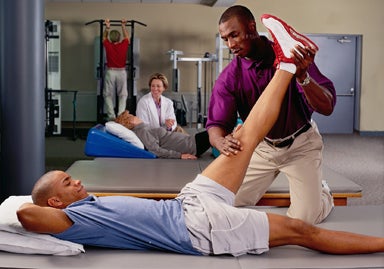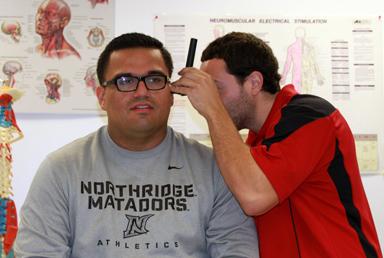Of course team spirit is strong on campus, but CSUN is actually only one of eighteen clinical sites in the community. “One of our objectives is to give our students clinical experience in all major employment areas for Athletic Trainers,” Stecyk said. Beyond CSUN Athletics, the program has clinical rotations at USC, Pepperdine, and many community college and high school athletics settings. We also have clinical rotations in medical and allied health clinics such as Southern California Orthopedic Institute (SCOI), Primary Care Sports Medicine, and multiple physical therapy/rehabilitation clinics.
 We want to prepare our students academically and clinically to be the best clinicians possible. “The range of injuries our students learn to prevent, diagnose, rehabilitate and/or manage is any musculo-skeletal, neurological and/or brain (ie. concussion) pathology. ” Stecyk said. Alongside their preceptors, ATSs help provide health care for the basketball and soccer teams at CSUN, but they have opportunities to interact with patients from all sports teams.
We want to prepare our students academically and clinically to be the best clinicians possible. “The range of injuries our students learn to prevent, diagnose, rehabilitate and/or manage is any musculo-skeletal, neurological and/or brain (ie. concussion) pathology. ” Stecyk said. Alongside their preceptors, ATSs help provide health care for the basketball and soccer teams at CSUN, but they have opportunities to interact with patients from all sports teams.
Many people are unfamiliar with the scope of practice of an AT, and many people think of personal trainers when they hear the term AT. This couldn’t be farther from the truth. ATs are often the first allied health professional to be summoned when an injury occurs. They perform the initial “on-field/on-site” evaluation, determine appropriate transportation methods and referral, and then design and implement the appropriate rehabilitation program. “AT’s are specifically trained to recognize and manage the broad spectrum of musculo-skeletal injuries, from basic ankle sprains to the most serious injuries, such as cervical spine fractures or dislocations, ,” Stecyk said, We are of course most interested in prevention, and we also manage chronic conditions like diabetes and asthma.”
Patients with co-morbidities (more than one medical pathology or condition) or who are dealing with any range of medical conditions that still allow them to participate in their desired activity (i.e. sport, work, etc.) – but to proceed with any measure of caution—call for the skill of the athletic trainer.
In the sport setting “We start with the medical information from the physicians, we have athletes complete a pre participation physical examination and get cleared by the physician so, for example in the case of a player with diabetes, the athletic trainer will monitor glucose to help manage the condition and avoid problems,” Stecyk said.
The CSUN Athletic Training Program got its start in the mid 1970’s as one of the first college level Athletic Training programs in California and nationally. “When I arrived on campus in 2002, I wanted to see our program expand into the community,” Stecyk said. And as a result of this expansion, the university has strong alumni representation in the San Fernando Valley and Los Angeles area.
The Assistant Athletic Director for Sports Medicine/Head Athletic Trainer for CSUN Athletics is an alum as well. Steven Grech (1995) oversees the medical care for student athletes and is the athletic trainer (AT) for men’s basketball, women’s water polo and outdoor men’s and women’s track. “Steve is one of five preceptors at CSUN. As patients come into the clinic the students get their cases from Steve,” Stecyk said. “Also alums on the CSUN athletics staff are Assistant Athletic Trainers Eric Buitrago, Dunford Rodill and Ramzy Asaff.”
The growth through the community that Stecyk worked to develop is getting stronger with every graduating class. “We have strong representation in the area through our alumni. We have Full time AT’s who are preceptors for students in our program, and they are mentors/teachers in the clinical settings where our students practice. We have alumni at Children’s Hospital LA, Notre Dame High School, Alemany High School, El Camino Real High School, Palos Verdes High School, West LA College and, as mentioned before, USC, where two alumni from our program, Justin Shibel and Stephanie Hong, are Athletic Trainers.”
-Jean O'Sullivan
SP2014

